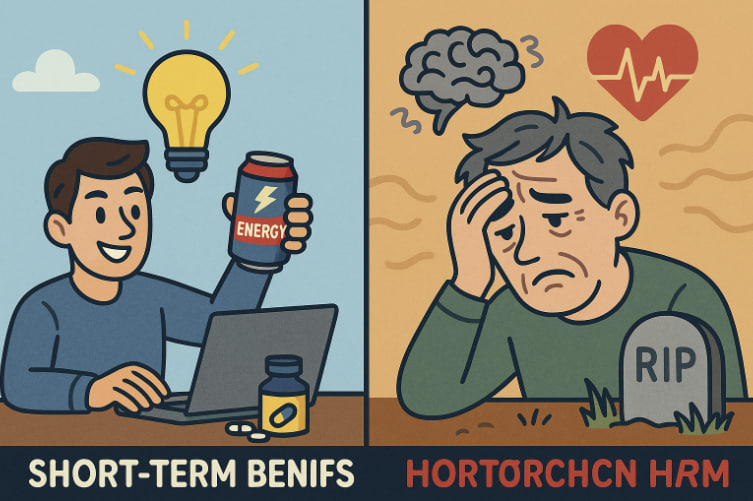In a world driven by performance, deadlines, and mental overload, many people turn to energy drinks and nootropics for a quick boost in energy, focus, or memory. These substances promise to enhance alertness and cognitive performance — and they often deliver. But what are the long-term consequences of relying on chemical stimulation? This article breaks down the short-term benefits and long-term risks of energy-enhancing substances.
What Are Energy Drinks and Nootropics?
Energy Drinks
These are beverages containing caffeine, sugar, B vitamins, and often herbal extracts like guarana or ginseng. Popular brands include Red Bull, Monster, and Burn. They are marketed to boost energy, alertness, and physical stamina.
Nootropics
Also known as “smart drugs,” nootropics are substances (natural or synthetic) used to enhance cognitive function, including memory, focus, and motivation. They include:
- Caffeine + L-theanine (found in tea)
- Modafinil (a prescription wakefulness drug)
- Racetams, ginkgo biloba, omega-3s, and more
Short-Term Benefits
Both energy drinks and nootropics can offer temporary improvements, followed by long lasting bad consequences, in such things as:
- Mental alertness
- Concentration and focus
- Memory retention (for some nootropics)
- Physical performance (especially from caffeine)
- Reaction time and motivation
Long-Term Risks and Side Effects
1. Caffeine Overuse
- Increased heart rate and blood pressure
- Insomnia and disrupted sleep cycles
- Tolerance and dependence
- Anxiety and irritability
- Risk of withdrawal symptoms (headache, fatigue, brain fog)
2. Sugar and Additives
- Energy drinks often contain high levels of sugar, leading to:
- Weight gain
- Blood sugar crashes
- Increased risk of type 2 diabetes
- Artificial sweeteners and preservatives may cause gut and metabolic disturbances
3. Neurological Effects of Synthetic Nootropics
- Long-term use of unregulated nootropics may cause:
- Mood instability
- Sleep disruption
- Unknown effects on developing brains (especially in teens and students)
- Cognitive fatigue or burnout if used chronically
4. Cardiovascular Strain
- Some stimulants constrict blood vessels or increase arrhythmia risk
- Combined use with alcohol or other drugs raises danger levels significantly
Hidden Psychological Costs
- Dependency mindset: Belief that performance isn’t possible without chemical aid
- Overconfidence or impaired judgment due to stimulant-induced euphoria
- Burnout risk increases when natural rest and recovery are ignored
Safer Alternatives for Energy and Focus
- Good sleep hygiene: Foundation of cognitive function
- Balanced nutrition: Especially omega-3s, B vitamins, and hydration
- Exercise: Improves both mental alertness and mood naturally
- Mindfulness practices: Reduce stress and improve mental clarity
- Structured work cycles: Like the Pomodoro technique (work–break balance)
Conclusion
Only black roasted coffee with no additions can provide quick win, but it is not a sustainable solution for performance or well-being, for all other i reccomend not to use at all. Reliance on them can damage both physical and mental health. Lasting focus, energy, and productivity come from restorative practices, healthy routines, and a balanced brain — not from a bottle.
Glossary
- Nootropics – substances that enhance brain function (natural or synthetic)
- Caffeine – a central nervous system stimulant found in coffee, tea, and energy drinks
- Cognitive performance – the ability to think, learn, and remember
- Burnout – a state of physical and mental exhaustion due to prolonged stress
- Pomodoro technique – a time management method based on timed work–break intervals


